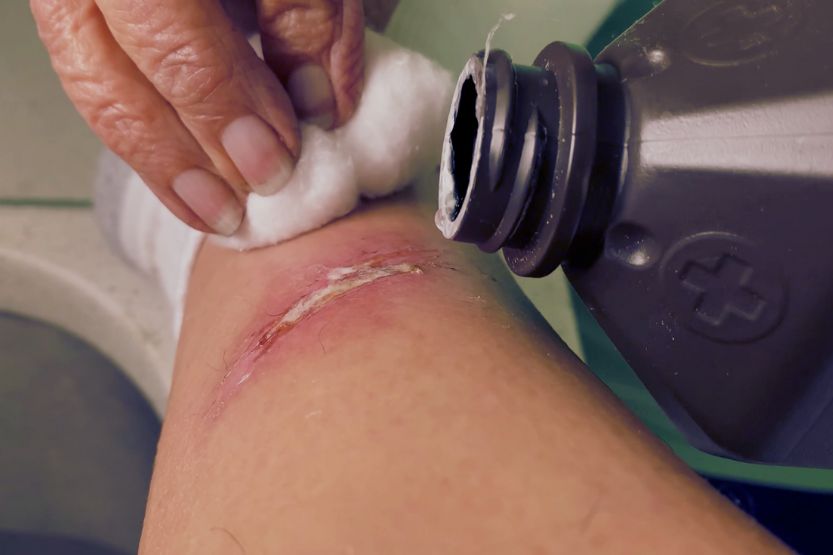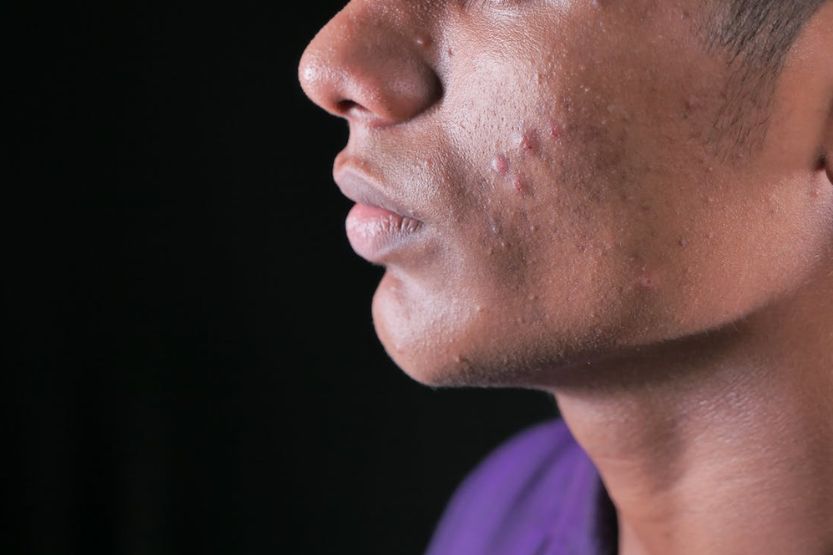Hydrogen peroxide tends to make your skin turn white. Have you ever wondered why this happens? Why does hydrogen peroxide turn skin white when you use it to disinfect cuts?
Human skin turns white when it touches hydrogen peroxide because of a natural bodily reaction called a capillary embolism. When capillary embolism happens, blood flow to the capillaries is significantly minimized. Because of the limited blood flow, the skin appears significantly paler than normal.
Read on to learn why hydrogen peroxide turns skin white and other interesting facts about this chemical.
Why Does Hydrogen Peroxide Turn Skin White?

When applying hydrogen peroxide to clean small cuts and scratches, chemical bubbling is not the only thing that will happen. Let’s touch on the topic of chemical bubbling later.
Making hydrogen peroxide contact with your wound’s skin will turn it whiter. Why does hydrogen peroxide turn your skin white?
Capillary Embolism
One apparent reason is the natural bodily reaction called a capillary embolism. This process involves temporarily hampering the blood flow into the capillaries. The temporary blood loss exposes the skin color to hydrogen peroxide whiter than the remaining skin.
This is why the skin exposed to hydrogen peroxide temporarily becomes whiter. Once the blood flow normalizes and blood makes its way into the capillaries, your skin will go back to normal.
Mild Hydrogen Peroxide Solutions Can Irritate the Skin
Based on the studies made by the Center for Disease Control (CDC), mild hydrogen peroxide solutions can irritate the skin.
3% Hydrogen Peroxide Solution Is Commonly Used for Treating Wounds
Typical hydrogen peroxide that you can buy from drug stores, usually used for treating wounds, is a 3% solution. On the other hand, higher hydrogen peroxide concentrations might cause serious chemical burns.
What Is Hydrogen Peroxide?
Commonly Used to Clean Minor Scrapes and Scratches
Hydrogen Peroxide (H2O2) is a chemical commonly used to clean minor scrapes and scratches. For this purpose, you could use a 3% to 6% hydrogen peroxide solution.
Once Popular Due to Its Antiseptic Properties
This mild antiseptic was once popular because it was believed to prevent wounds from getting infected. The reason is that it can stop bacteria growth in its tracks.
However, according to recent studies, the disinfecting properties of hydrogen peroxide are not that significant. It also seems to do a little in slowing down bacteria growth. In addition, hydrogen peroxide is no better than plain water for larger and more severe wounds.
Hospitals and Clinics Still Use Hydrogen Peroxide to Treat Minor Cuts
However, several hospitals and clinics still use hydrogen peroxide to treat minor cuts and scrapes.
Aside from disinfecting wounds, it is also a common ingredient in many household cleaning products. These include hair and oxy-cleaning bleach, teeth whitening products, and nail whiteners.
Oral Care Products Contain Hydrogen Peroxide
Oral care products contain hydrogen peroxide, usually prescribed for treating mouth sores.
Do Not Use Hydrogen Peroxide with More Than 10% Concentration
Do not use hydrogen peroxide with more than 10% concentration, especially for treating wounds. This is too strong and might cause serious chemical burns.
Not Suitable for Drinking
In addition, you obviously should not drink hydrogen peroxide in any concentration. You would be at risk of being brought to the emergency room if you did.
Applying Hydrogen Peroxide to the Skin Causes Capillary Embolism
Applying hydrogen peroxide to the skin causes capillary embolism or micro embolism. When that happens, blood stops flowing into the capillaries, making that patch of skin seem lighter than the surrounding area.
The skin also appears whiter because of the oxygen bubbles in the skin capillaries. However, it is a temporary effect only. As soon as the blood begins to flow again, the skin color will return.
Does Hydrogen Peroxide Bleach Skin Permanently?
So, why does hydrogen peroxide turn your skin white? As mentioned earlier, hydrogen peroxide can whiten the skin, albeit temporarily.
It provides quick results but using it often enough can make it harmful. Almost all dermatologists strongly advise against the repeated use of hydrogen peroxide.
The longest that you can whiten your skin using hydrogen peroxide is just a week or two. You will need a strong hydrogen peroxide solution to get that kind of result. Something with at least 20% concentration is advisable.
A household cleaning product with just 3% hydrogen peroxide is strong enough to remove grime from your kitchen counter. Just think about what a product with 20% H2O2 concentration can do to your skin.
Is Hydrogen Peroxide Safe for Skin?
Not Safe to Use for Whitening Skin
It is not safe to use hydrogen peroxide to whiten your skin, especially on your face. You need a hydrogen peroxide solution with a rather high concentration to somewhat bleach your skin whiter.
Your facial skin is more sensitive and prone to damage compared to the skin on your hands or feet. There are many horror tales of people who suffered from the adverse effects of strong hydrogen peroxide. Most of them experienced the unwanted effects after using it to whiten their faces.
Can Cause Itching and Swelling
Most suffered from mild symptoms, like itching and slight swelling and redness. However, those with pre-existing skin ailments, like skin allergies or acne, got the worst reaction from the chemical.
May Cause a Burning Sensation and Rashes
Those with severe allergies reportedly suffered from a burning sensation and rashes that rapidly spread all over their faces. They also experienced severe itching. The itchiness got so bad that the skin started to peel off their faces in some cases.
Might Cause Skin Irritation for People with Severe Acne
People with severe acne and who used extra-strong hydrogen peroxide on their faces experienced even more severe skin irritation. This often led to increased and more painful inflammation. In most cases, using hydrogen peroxide increases the rate of acne development.
Why Does Hydrogen Peroxide Foam White?
You may be mesmerized when looking at how hydrogen peroxide reacts when you use it to treat small wounds. It forms bubbles or white foams on cuts and scratches. Why does it happen?
This reaction is due to hydrogen peroxide being an oxidizer. It creates a white foam when it touches staphylococcus bacteria and/or blood. When you apply it to your skin, and it starts to foam, it means it kills bacteria through oxidation.
Almost all organisms in the world contain catalase. This enzyme is responsible for making water and oxygen when exposed to hydrogen peroxide. Once the hydrogen peroxide touches blood and/or bacteria, it produces foam. The reason is that the reaction creates water and oxygen.
Possible Side Effects of Hydrogen Peroxide

Even if often used to treat wounds, hydrogen peroxide is still a chemical with serious side effects. The stronger the concentration you use, the more severe the side effects:
1. Can Cause Skin Irritation
Even commercially available 3% concentration hydrogen peroxide can irritate the skin. Using a stronger concentration can cause chemical burns and blistering of the skin.
2. Might Pose a Serious Risk After Accidentally Ingesting Hydrogen Peroxide
It gets even worse if you accidentally ingest hydrogen peroxide. A lower concentration of hydrogen peroxide might not pose a serious health risk.
3. Nausea, Mouth Sores, and More
However, you might foam at the mouth or suffer from nausea for a while. Moreover, because hydrogen peroxide is an irritant, it might also cause mouth sores and stomach pains.
It gets much worse when you accidentally swallow highly-concentrated hydrogen peroxide. If this ever happens to you, seek emergency assistance immediately.
4. Other Side Effects
Strong hydrogen peroxide solution can cause:
- Stomach and intestinal ulcers
- Chemical burns on the esophageal walls
- Severe nausea
- Severe and bloody diarrhea
- Migraines
Again, why does hydrogen peroxide turn skin white? When your skin turns white after dabbing hydrogen peroxide on your wound, it kills the bacteria on your skin.
How Dangerous Is Hydrogen Peroxide?
Might Cause Water in the Lungs When Ingested
Ingestion of hydrogen peroxide can also cause life-threatening side effects like water in the lungs. It could be because of the reaction of hydrogen peroxide.
Risk of Violent Convulsions
There is also a risk of violent convulsions resulting from your body going into shock.
Effects of Prolonged Exposure to Hydrogen Peroxide Fumes
Even inhaling the fumes of strong hydrogen peroxide can be dangerous. Hydrogen peroxide at 20% concentration and stronger is usually for laboratory settings. Those who handle it use breathing protection.
The reason is that prolonged exposure to hydrogen peroxide fumes can lead to:
- Shortness of breath
- Coughing
- Chest congestion
- Bleeding in the lungs
Do Not Store Concentrated Hydrogen Peroxide in Your Home
Let this be a warning: never keep concentrated hydrogen peroxide in your home. Commercially-available hydrogen peroxide, which is 3% to 6% concentration, should be safe.
However, you should still keep it away from the reach of children. Also, make sure that it has a clear label not to mistake it for something else.
Uses for Hydrogen Peroxide
Although it is not safe to use as a skin whitening product, hydrogen peroxide has several other uses. These include the following:
1. Mouthwash
You need to dilute the hydrogen peroxide to the absolute bare minimum. Do it just enough that it will still be effective in killing the germs in your mouth. It should also still be weak enough that it will not irritate your skin.
First, get the regular 3% hydrogen peroxide solution. This is the common type that you can get in most drugstores. Now, take one part of the hydrogen peroxide, and mix it with two parts of water. You now have a 1% hydrogen peroxide solution in your glass.
Use it as you would any regular mouthwash, and avoid ingesting too much of it. Don’t gargle the solution for more than 90 seconds. Spit it out. If there is still a bit of an aftertaste left in your mouth, you can gargle with just water.
2. Household Disinfectant
Hydrogen peroxide may not be the best choice for disinfecting wounds these days. However, it is still a great household cleaning aid. Hydrogen peroxide is better than bleach because it will not leave your house smelling like a newly-cleaned swimming pool.
To use hydrogen peroxide properly, remove most dirt and grime off the surface using plain soap and water. Afterward, spray a 50-50 solution of hydrogen peroxide and water. You don’t need to rinse this off and just let it air dry.
You can also use this spray for disinfecting your kitchen countertop, bathroom tiles, and kids’ toys. It is also helpful in cleaning other things that need to be sanitary.
However, if you use hydrogen peroxide to disinfect cooking utensils, you need to rinse them using clean water. Also, avoid getting any peroxide on your clothes as it might bleach them and fade the colors.
3. For Cleaning Produce
Are you searching for an effective way to rinse dirt and pesticides from your store-bought fruits and vegetables? Then hydrogen peroxide can do a great job.
First, fill a large bowl with water and add a quarter cup of 3% concentration hydrogen peroxide. Proceed to wash your fruits and vegetables in the peroxide solution. After that, rinse thoroughly using clean water.
Since the hydrogen peroxide killed all the bacteria on the fruits and vegetables, it essentially extended their shelf life.
4. Stain Remover
Hydrogen peroxide is a great stain remover. It is also milder than bleach, so you don’t have to worry about your clothes fading. However, when using it on your colored clothes, test it on a hidden spot first. This is to ensure that it does not react negatively to the dyes.
Here are some of the ways to use the stain-removing qualities of hydrogen peroxide:
Cleans and Whitens Carpets
If you have white or off-white carpets or rugs, you can spray the hydrogen peroxide directly on the stains. Let the peroxide sit for a couple of minutes, and then scrub lightly using a clean cloth.
Removes Stains on Clothes
To remove stains on white clothes, let them soak in a bucket of water mixed with a cup of peroxide. You can also use peroxide instead of laundry bleach when washing the stained clothes.
If you are treating colored clothes, you can spot treat the stains using a bit of hydrogen peroxide at a time. Test the peroxide on a hidden portion first before using it on the stain.
Whitens Tile Grout
Put the 3% hydrogen peroxide solution in a spray bottle, and spritz it directly on the tile grout. It will immediately start to foam and bubble. Let it sit for 3 to 5 minutes, and then scrub the grout using a stiff brush. Repeat as necessary.
When Should You NOT Use Hydrogen Peroxide?

Despite having a lot of uses, there are also instances when you should not use hydrogen peroxide. These include the following:
Do Not Use It on Wounds
Hospitals and clinics have used hydrogen peroxide to disinfect small wounds for years. If you were a kid during the 80s or early 90s, you’ve probably had your scrapes treated with it. It could be either hydrogen peroxide or the dreaded red Merthiolate.
Does Not Do Much in Disinfecting Wounds
Thank goodness that medical experts discovered that both those dreaded antiseptics do not do much in terms of disinfecting wounds. Hydrogen peroxide is painful to use, but it also irritates the skin. This means that peroxide is doing more harm than good.
Wash the Area Using Soap and Clean Water
So, what should you use to treat minor wounds? It would be best to wash the area using soap and a lot of clean water. Afterward, use your towel to dry the wounded area. Apply some antibiotic ointment to the wound and cover it using a bandage.
Seek Emergency Medical Assistance
If the wound is too large, you should seek emergency medical assistance. This approach is also better if there is quite a lot of bleeding. Using hydrogen peroxide on a large gash will be extremely painful. You will also get next to nothing for your suffering.
Do Not Use It to Treat Acne
You might have noticed that most acne treatment creams contain benzoyl peroxide. However, benzoyl peroxide is different from hydrogen peroxide, and you should avoid using the latter to treat acne.
Hydrogen Peroxide Irritates the Skin
First, it has already been established that hydrogen peroxide irritates the skin, thereby making your acne worse. In addition, hydrogen peroxide quickly dissolves in water.
Worsens Acne
This means its disinfecting effects do not last as long as needed. If you use hydrogen peroxide often enough, it will only worsen your condition.
Meanwhile, benzoyl peroxide leaves a thin film covering the skin, allowing it to penetrate the pores. This means the benzoyl peroxide can continue fighting the germs that cause acne for hours.
If you cannot find benzoyl peroxide products, look for something with salicylic acid. However, consult a dermatologist if you suffer from a severe acne breakout. You have to seek the help of a professional instead of trying to treat it yourself.
Conclusion – Why Does Hydrogen Peroxide Turn Skin White?
Your skin turns white when exposed to hydrogen peroxide due to capillary embolism. It is a natural reaction that temporarily minimizes blood flow going to the capillaries in the skin. Because there is no blood flow, the skin appears paler than usual.
How long is skin white after using hydrogen peroxide? If you are looking for a permanent skin whitening solution, you will be severely disappointed with hydrogen peroxide.
The reason is that its effects can only last for a week, maybe two at most. This means you will need constant hydrogen peroxide treatments. However, it is not a good idea as it will irritate your skin.
It is best to ask your dermatologist for professional suggestions for skin whitening. The reason is that hydrogen peroxide may only ruin your skin.
Read next:



